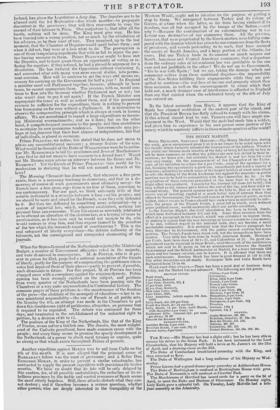When the States-General of the Netherlands rejected the 'Ministerial Budget,
a number of Government officiaries voted in the majority, and were dismissed in consequence. M. de POTTER, who is at pre- sent in prison for libel, projected a national association of the friends of liberty, partly for the purpose of compensating the gentlemen whose votes had deprived them of their places—partly to prevent, if possible, such -dismissals in future. For this project, M. de POTTER has been charged anew with a conspiracy against the reigning dynasty. Public opinion has been strongly excited on the subject, and petitions from every quarter of theNetherlands have been pouring into the i
Chambers n a way quite unprecedented in Continental history. The common prayer of these petitions is—the maintenance of the freedom of the press—the abolition of the monopoly of education—a law to in- sure ministerial responsibility—the use of French in all public acts. On Monday the 8th, an attempt was made in the Chambers to put down this troublesome right of petitioning, altogether, on pretence that it required to be regulated-. The debate was continued for three days, and terminated in the establishment of the unlimited right to petition, by a division of 88 to 11.
The position of the King of the Netherlands, like that of the King of France, seems rather a ticklish one. The Jesuits, the most enlight- ened of the Catholic priesthood, have made common cause with the people ; and every thing seems to promise the speedy development in the Netherlands of a power to check royal tyranny or caprice, quite as strong as that which exists throughout France at present.


















 Previous page
Previous page